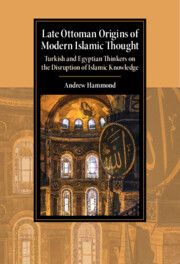
- Publisher:
- Cambridge University Press
- Online publication date:
- November 2022
- Print publication year:
- 2022
- Online ISBN:
- 9781009199544
- Subjects:
- Middle East Studies, Islam, Area Studies, History, Religion, Middle East History


In this major contribution to Muslim intellectual history, Andrew Hammond offers a vital reappraisal of the role of Late Ottoman Turkish scholars in shaping modern Islamic thought. Focusing on a poet, a sheikh and his deputy, Hammond re-evaluates the lives and legacies of three key figures who chose exile in Egypt as radical secular forces seized power in republican Turkey: Mehmed Akif, Mustafa Sabri and Zahid Kevseri. Examining a period when these scholars faced the dual challenge of non-conformist trends in Islam and Western science and philosophy, Hammond argues that these men, alongside Said Nursi who remained in Turkey, were the last bearers of the Ottoman Islamic tradition. Utilising both Arabic and Turkish sources, he transcends disciplinary conventions that divide histories along ethnic, linguistic and national lines, highlighting continuities across geographies and eras. Through this lens, Hammond is able to observe the long-neglected but lasting impact that these Late Ottoman thinkers had upon Turkish and Arab Islamist ideology.
‘With impressive language skills and theoretical perspectives, Hammond offers a much-needed correction to the historiography of modern Muslim intellectual history. By orienting our gaze to the linkages between the imperial Ottoman debates on reforming the Islamic tradition and the Egyptian intellectual circles of the interwar period, Hammond offers one of the most original insights on the roots of Cold War-era Islamist thought.’
Cemil Aydin - University of North Carolina at Chapel Hill
‘Hammond is the first to show how the intellectual activism of Mehmed Akif, Mustafa Sabri, and Zahid Kevseri profoundly put its stamp on modern Islamic thought and contemporary intra-Islamic polemics. Using both Arabic and Ottoman/Turkish sources, this study provides solid ground for further analysis of unjustly overlooked Late-Ottoman Islamic thinkers.’
Pieter Coppens - Vrije Universiteit Amsterdam
‘By reintroducing us to some major but now partly forgotten scholars and public intellectuals, this innovative study brings perspective, depth, and nuance to the history of modern Islamic thought. Its examination of religious trends in Turkey and Egypt, the movement of ideas between them, the genealogy of Salafism, and the early history of Islamism are all highly illuminating. It deserves to be read widely.’
Muhammad Qasim Zaman - Princeton University
‘Andrew Hammond's work on late Ottoman exiles in Egypt fills a major gap in the study of modern Islamic thought. His meticulous and erudite analysis unravels their part in the fierce controversies surrounding Islamic Modernism and Salafism, and their influence on the Muslim Brotherhood and the Islamic party in Turkey.’
Itzchak Weismann - University of Haifa
 Loading metrics...
Loading metrics...
* Views captured on Cambridge Core between #date#. This data will be updated every 24 hours.
Usage data cannot currently be displayed.